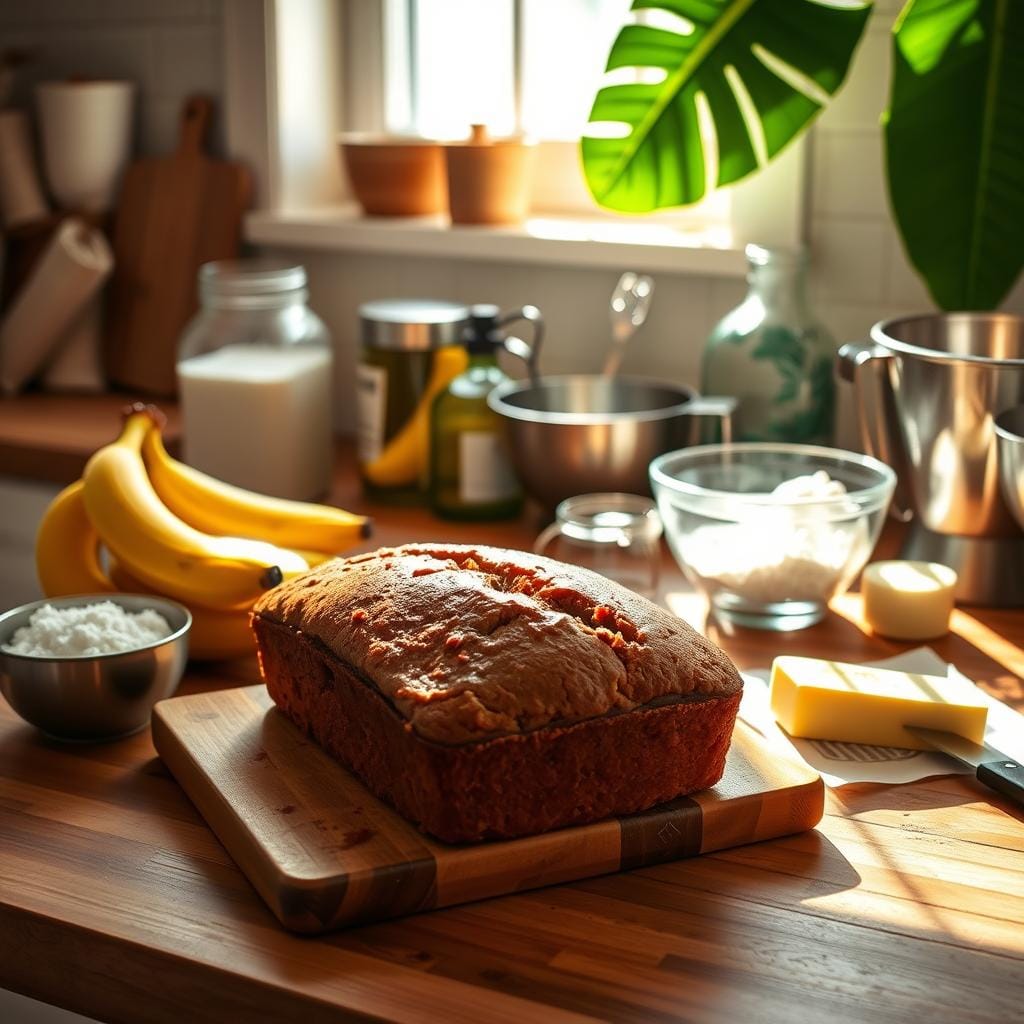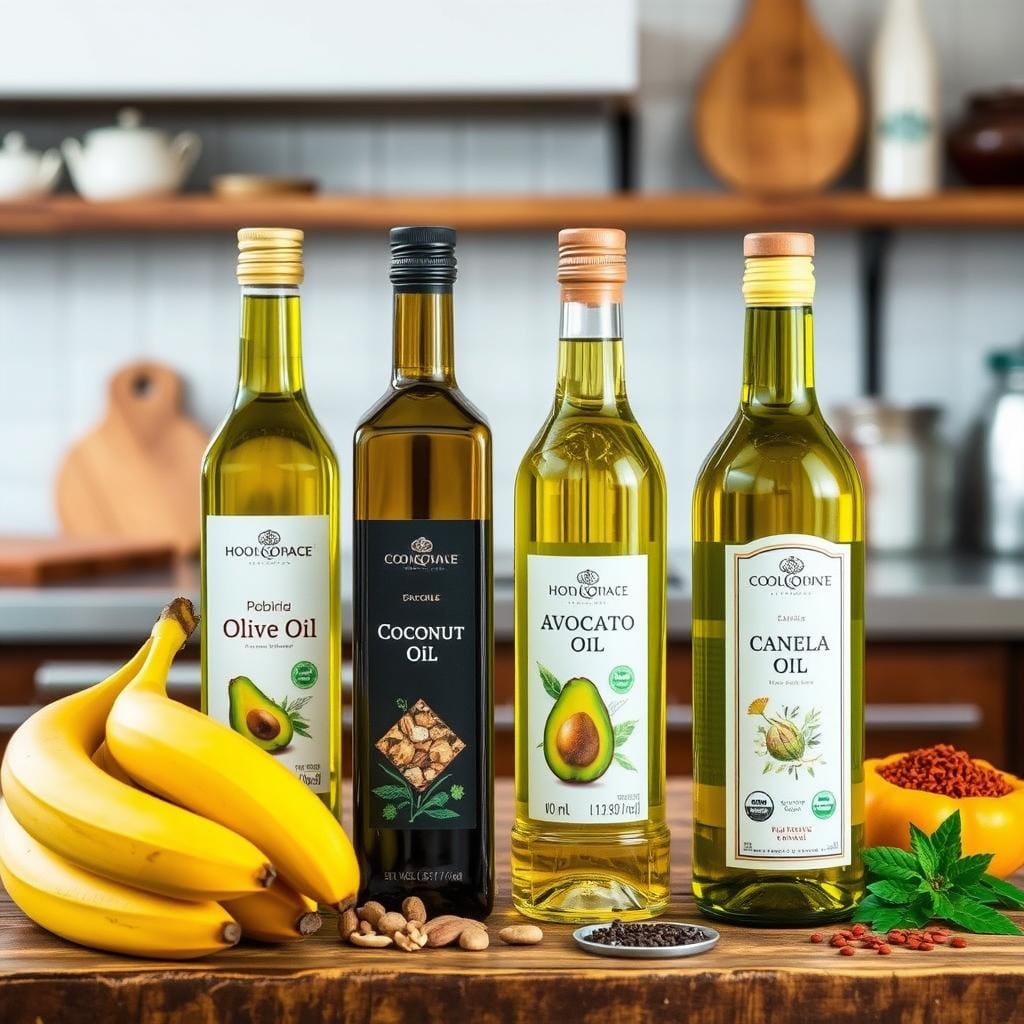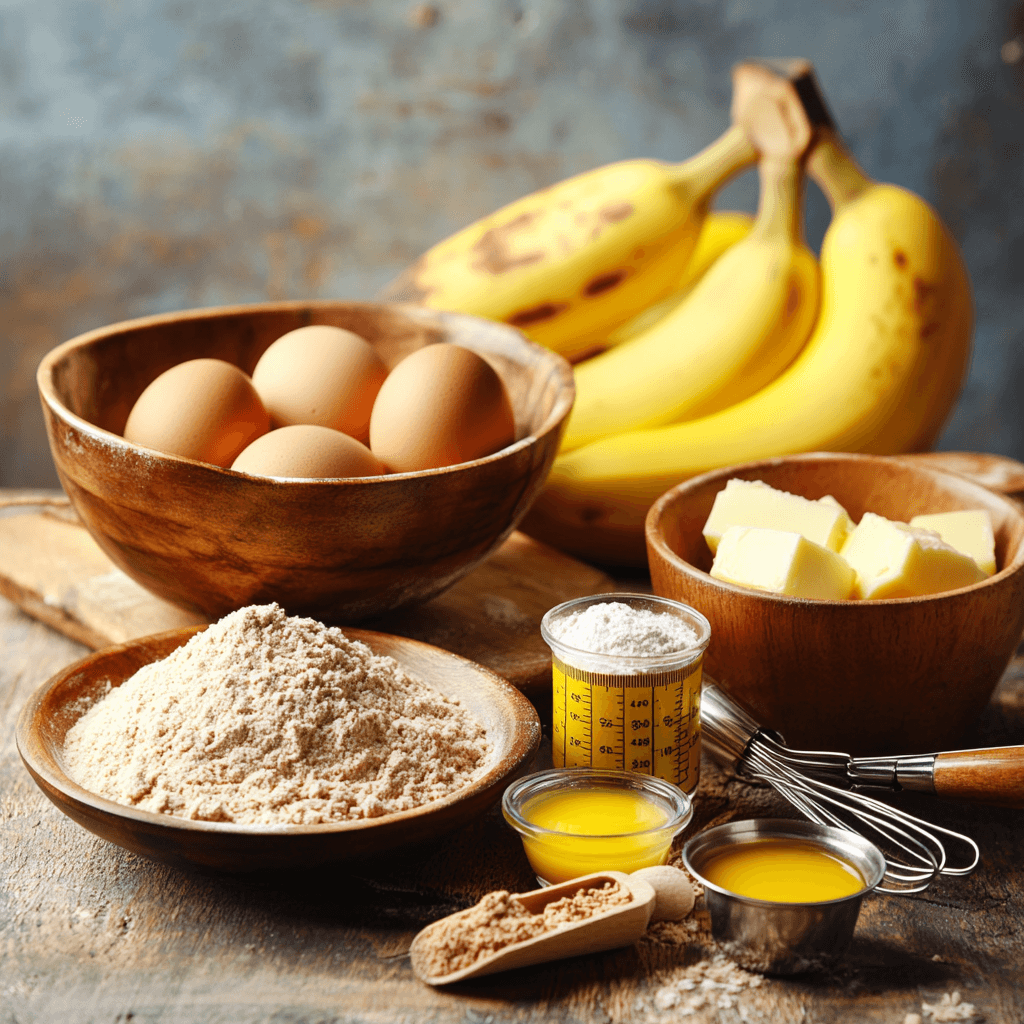When banana bread bakes, a question pops up: oil or butter, which is better? Many bakers face this choice, each with its own benefits. But, with some tips, you can make the moistest, tastiest banana bread ever.
I’ve been trying to perfect banana bread, testing different methods and ingredients. I’ve had successes and failures, but learned fats are key. They greatly affect the bread’s taste and texture.
This guide explores the world of baking fats, comparing oil and butter in banana bread. It’s for both experienced and new bakers. You’ll learn to make the most delicious banana bread your loved ones will love.
Key Takeaways
- Understanding the role of fats in banana bread baking is crucial for achieving the perfect texture and flavor
- Butter and oil have unique chemical properties that affect the baking process and final product
- Choosing the right fat can impact the moisture content, shelf life, and overall appearance of your banana bread
- Adjusting butter-to-oil ratios in recipes can help you find the perfect balance for your personal taste preferences
- Mastering the art of banana bread baking requires attention to temperature, mixing techniques, and other key factors
Understanding the Role of Fats in Banana Bread Making
Baking banana bread requires knowing about fats. Fats like butter or oil affect the moisture in baked goods. They also change the texture, structure, and flavor.
Chemical Reactions During Baking
The type of fat used affects baking. Butter, a solid fat, traps air bubbles. This makes the bread light and fluffy. Liquid oils, however, don’t do this, making the bread denser.
Impact on Texture and Structure
The fat choice affects your banana bread‘s texture and structure. Butter makes the bread tender and moist. Oil makes it denser and more moist.
Flavor Development Process
Fats are key in banana bread flavor. Butter adds a rich taste, enhancing banana sweetness. Oils have a neutral taste, letting banana flavor stand out.

Knowing how fats impact baking helps in choosing between butter and oil. This knowledge is crucial for your banana bread recipes.
The Classic Butter Option: Pros and Cons
The debate of is oil or butter better for banana bread? highlights butter’s role. Butter adds a rich flavor and makes the bread tender. It’s a favorite among bakers.
But, using butter in banana bread has some downsides. Let’s look at the good and bad sides of butter in banana bread:
Pros of Butter
- Unparalleled Flavor: Butter gives banana bread a unique taste.
- Tender Texture: Its high fat content makes the bread soft and delicious.
- Aesthetic Appeal: Butter makes the bread’s crust golden and shiny.
Cons of Butter
- Shorter Shelf Life: Butter-based banana bread doesn’t last as long as oil-based.
- Higher Saturated Fat: Butter has more saturated fat than oils, which might be a concern for some.
- Potential for Greasiness: Too much butter can make the bread greasy.
Choosing between is oil or butter better for banana bread? depends on your taste and recipe needs. Knowing the pros and cons of each fat helps you decide for your next banana bread.
Why Consider Oil for Your Banana Bread
Thinking of changing your banana bread recipe? Using oil instead of butter might be a good idea. Oil can make your baked goods healthier and more moist. Let’s look at why oil could be the better choice for your banana bread.
Types of Oils Suitable for Baking
Not all oils are good for baking. Some work better than others. Here are some oils you can use for banana bread:
- Vegetable oil
- Canola oil
- Coconut oil
- Olive oil (for a subtle flavor)
These oils add moisture without taking over the banana flavor.
Health Benefits of Using Oil
Using oil in your banana bread has health perks. Oils like vegetable and canola oil are healthier than butter. They make your banana bread healthier without losing flavor or texture.
Storage and Shelf Life Advantages
Oil also helps your banana bread last longer. Oils keep better than butter, which can go bad fast. So, your banana bread stays fresh longer, saving you from waste and letting you enjoy every bite.

Is Oil or Butter Better for Banana Bread?
Choosing between oil and butter can greatly affect your banana bread. Both fats are key for texture, flavor, and quality. Let’s look at the good and bad of each to help you choose.
The Butter Option
Butter gives banana bread a rich, indulgent taste. It makes the bread creamy and buttery, a classic favorite. But, butter can also make the bread denser and drier over time.
The Oil Alternative
Oil makes banana bread lighter and moister. Oils like vegetable, canola, or coconut oil create a tender crumb. They also help the bread stay fresh longer. Some oils, like olive oil, add flavors that enhance the banana taste.
The Verdict
Choosing between oil and butter depends on what you want. Butter is great for a rich flavor. Oil is better for a moist, tender bread that lasts longer.
Whichever you choose, follow the recipe well. Adjust other ingredients to get the texture and taste you want. Try mixing oils and butters to find the best mix for your banana bread ingredients.
“The key to perfect banana bread lies in the right balance of fats, whether you choose butter or oil.”
Moisture Content: Comparing Oil vs Butter Results
Baking the perfect banana bread depends on the fat used. Let’s compare oil and butter’s effects on moisture. This will help you understand their impact on short-term freshness and long-term storage.
Short-term Freshness Analysis
Right after baking, you’ll see a big difference in moisture. Banana bread with oil is slightly more moist than the one made with butter. Oil spreads evenly in the batter, keeping it moist.
Butter-based banana bread might feel drier at first. This is because butter takes longer to mix into the batter. But, it still tastes great if eaten within a few days.
Long-term Storage Effects
The real test is how well the bread lasts. Oil-based recipes win here. They stay soft and tender longer, even at room temperature.
Butter-based banana bread dries out faster, especially if not sealed well. This can make it crumbly and less tasty over time.
Choosing between oil and butter depends on what you like. Both can make delicious banana bread. Knowing how they affect moisture helps you pick the best for your taste and baking goals.
Texture Differences Between Oil-Based and Butter-Based Recipes
Choosing between oil and butter in banana bread affects the texture. Knowing these differences helps you get the texture you want. Whether you like a moist or light bread, it’s all about the choice.
Oil-based banana bread is tender and moist. The oil’s fat content makes the bread soft and delicate. It feels like it melts in your mouth, perfect for those who love a rich taste.
Butter-based banana bread, however, is denser and more structured. The butter’s solid fat creates a firmer texture. This is great for those who prefer a more homemade banana bread.
| Texture Attribute | Oil-Based Banana Bread | Butter-Based Banana Bread |
|---|---|---|
| Crumb Structure | Tender and delicate | Denser and more substantial |
| Mouthfeel | Soft and melts-in-your-mouth | Heartier and more substantial |
| Overall Texture | Moist and indulgent | Slightly drier and more traditional |
Choosing between oil and butter depends on your preference and desired texture. Try both to see which suits your baking style and taste best.
Flavor Profile Analysis: How Each Fat Affects Taste
The choice between oil or butter in banana bread matters a lot. Let’s see how each fat changes the taste.
Butter’s Distinct Contributions
Butter is known for its rich, creamy taste. In banana bread, it makes the bananas sweeter and balances the flavors. It also brings a comforting, homemade taste.
Oil’s Neutral Properties
Oil, like vegetable or canola oil, has a mild taste. This lets the banana’s natural sweetness and flavor stand out. Oil makes the banana taste clearer and more straightforward.
| Flavor Characteristic | Butter | Oil |
|---|---|---|
| Richness | High | Low |
| Dairy Notes | Present | Absent |
| Banana Flavor Prominence | Moderate | High |
Choosing between oil or butter for banana bread depends on what you like. Both can make the bread delicious and moist. But, they taste different.
Making the Switch: Converting Butter to Oil Ratios
Want to make your banana bread healthier? Try swapping butter for oil. But, it’s not always easy because butter and oil act differently in baking. Don’t worry, we’ve got tips on banana bread baking tips and healthy baking substitutions to help.
To switch from butter to oil, use 3/4 the amount of oil as butter. For instance, if a recipe needs 1 cup of butter, use 3/4 cup of oil.
- Choose a neutral oil like canola or vegetable oil. They won’t overpower the banana taste.
- Adjust other wet ingredients like milk or yogurt. You might need to reduce them to keep the right consistency.
- Think about the oil’s smoke point. Use oils like avocado or grapeseed oil. They won’t burn during baking.
Switching to oil can change your banana bread game. With a few tweaks, you’ll get a moist, tasty loaf that’s healthier.
Best Practices for Both Methods
Whether you like the taste of butter or the ease of oil in your banana bread baking, there are key tips for success. Choosing the right ingredients, mixing them well, and controlling the temperature are all important. These steps help make your quick breads the best they can be.
Ingredient Selection
Choosing the best fat for quick breads depends on what you prefer. For butter, pick unsalted for better control over salt. For oil, go with something like canola or vegetable oil. This keeps the banana flavor in the spotlight.
Mixing Techniques
- Cream the butter and sugar well to add air and make the bread light and tender.
- When using oil, mix wet ingredients first. Then gently add dry ingredients to avoid mixing too much.
- Scrape down the bowl sides with a spatula while mixing. This ensures all ingredients are well mixed.
Temperature Considerations
The baking temperature is key for the right texture and look of your banana bread. Use an oven between 350-375°F (175-190°C). This will give you a golden crust and a soft inside, no matter if you use butter or oil.
| Baking Tip | Butter-Based Bread | Oil-Based Bread |
|---|---|---|
| Oven Temperature | 350-375°F (175-190°C) | 350-375°F (175-190°C) |
| Baking Time | 55-65 minutes | 50-60 minutes |
| Doneness Test | Toothpick inserted comes out clean | Toothpick inserted comes out clean |
By following these banana bread baking tips, you can make delicious bread every time. It doesn’t matter if you use butter or oil.
Expert Tips for Perfect Banana Bread Every Time
Want to make banana bread that’s always a hit? Whether you use oil or butter, some expert tips can help. These tips will make your banana bread moist, flavorful, and always delicious.
Temperature Considerations
The temperature of your ingredients matters a lot. Make sure your eggs, butter (or oil), and bananas are room temperature before mixing. This helps the ingredients blend smoothly, avoiding a tough or gummy texture.
Mixing Techniques
- Don’t overmix the batter. Fold the ingredients gently until just combined. This prevents a dense, tough crumb.
- Use the paddle attachment on a stand mixer on the lowest speed. This avoids air pockets.
- For a lighter texture, whisk the wet and dry ingredients together. This is better than using a spoon or spatula.
By following these tips, you’ll make perfect banana bread every time. It doesn’t matter if you use oil or butter in your recipe.
Conclusion
Both oil and butter can make delicious banana bread. Your choice depends on what you like and what you want your bread to be like. Butter gives a rich taste and soft texture. Oil makes the bread moist and light, letting the banana flavor stand out.
The question of is oil or butter better for banana bread? has no single answer. Try both banana bread ingredients to see which you like best. Think about how moist, textured, and flavored you want your bread to be.
Whether you choose oil or butter, the secret to great banana bread is in the basics of baking. Use ripe bananas and the right mix of wet and dry ingredients. Pay attention to how you mix and bake. With practice and these tips, you’ll make banana bread that everyone will love.

